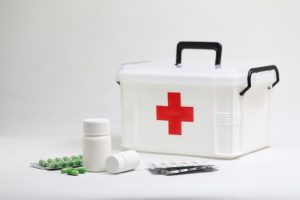Treating a Severe, Rapidly Developing Allergic Reaction to an Allergy Injection
For a rapidly developing allergic reaction causing hives (red. Itchy blotchy rash), swelling of hands, feet or face, breathing difficulties like wheezing, chest tightness, shortness of breath, then do the following:
Administer an Epi-Pen Injector if on hand to give. Remove the blue cap and press the orange end firmly into the outside of the thigh (through clothing works fine). Count to 5 after you hear it click and remove it. The orange end will be longer indicating that it has injected the epinephrine and moved out over the needle to cover it. It usually takes this medication just a few minutes to start working. If you have another Epi-Pen on hand, it can be repeated in 10 minutes if the improvement is not significant. Usually one dose works well but a second dose is safe to give if not improving. It is safe to administer an Epi-Pen even if a reaction is not necessarily severe enough to require it. It is much safer to go ahead and use it when it might not have been needed than not give it when it should have been done. If an Epi-Pen injection is not helping or you didn’t have one on hand it is best to seek emergency medical attention as soon as possible. Severe allergic reactions must be treated with epinephrine.
Take an antihistamine if available (see below).
If wheezing or shortness of breath is occurring and you have albuterol on hand please administer it (after the Epi-Pen if on hand) either in the nebulized form or with an asthma pump and repeat again in a few minutes if necessary if still having respiratory symptoms.
If it is during office hours call the following # while you drive back to our office:
- Tallahassee Office (850) 656-6269 Ext. #1
If we are closed call toll free (800) 241-5077 or (229) 228-2000 and have the Archbold Hospital operator page me. If I do not call back in a timely manner and the reaction is worsening then proceed to a facility where an epinephrine injection can be administered.
Treatment of Milder Allergic Reactions to Allergy Injections
Reactions affecting the nose, eyes and skin
If the reaction is causing mainly itching of the eyes and nose, sneezing, runny nose or mild itching of the skin, then take some kind of antihistamine medication like benadryl, hydroxyzine, Claritin (loratidine), Zyrtec (cetirizine), Allegra (fexofenadine), Clarinex, Xyzal, Chlortrimeton or any other similar medication (OTC medications that treat colds and are recommended for night time use generally contain an antihistamine) as quickly as possible if it is available (even if recently taken before you received the injection).
It is important to let the shot nurse know if you are having this type of reaction so she can adjust your shot dose back slightly and/or have you come a little more frequently. Sometimes these kinds of reactions occur when the shots are spread out a little too far and the previous shot has worn off before the next one is given. It does help to routinely take an antihistamine like Zyrtec (cetirizine), Allegra (fexofenadine), and Claritin (loratidine) the day of an injection but they take at least 30 to 60 minutes before they start to work.
Reactions just affecting the site where the shot was given
Allergy injections can cause two main types of reactions at the site where they are injected.
Rapid skin surface swelling with itching and redness:
This type of reaction occurs within minutes of the injection and often looks like a very big mosquito bite that itches intensely. This is an allergic reaction similar to the skin test that was done to start on shots. It is not a dangerous reaction and does not mean that more severe reactions are likely to occur in the future. It typically improves as the allergic immune system gets more desensitized over time but it can improve and worsen throughout the buildup.
If this type of reaction occurs, an antihistamine is helpful but unfortunately the non-sedating antihistamines Zyrtec (cetirizine), Allegra (fexofenadine), and Claritin (loratidine) take 30 to 60 minutes before they start to help. These work better to prevent the reaction from being as significant if taken earlier in the day to help prevent the reaction. Benadryl and Hydroxyzine work fast but can make people sleepy.
More delayed, deep swelling of the skin with redness, heat and some soreness:
This type of reaction usually is more delayed in onset than the surface reaction. It starts15 to 60 minutes to even hours after an injection, builds and spreads over hours and usually has more swelling, heat and soreness. It is more of an inflammatory reaction (white blood cells are drawn into the area over time) than an allergic reaction (allergic antibodies are already present and quickly release histamine). Some people are more prone to this type of reaction than others and will have this delayed reaction with most injections throughout the buildup phase. Sometimes these reactions will occur when an injection is given into the muscle instead of under the skin.
It does not help to back up the dose of allergy injection for these types of reactions and it is best to press on with the buildup. It can help in some cases to move the injection sites to other areas of the body that are less confined and where there is less chance of hitting muscle. One option is to give the injection in the more fatty part of the abdomen just above the hip bones (love handles) where diabetics give themselves injections.
These types of delayed inflammatory reactions are not helped very much by antihistamines since not that much histamine is involved in the reaction. They respond better to medications with anti-inflammatory effects. Each person responds a little differently to therapy so try different things and see what works best for you.
Ice or a frozen cold pack – that is applied to the site as soon as the injection is given or as soon as it begins to get red and sore may help.
Montelukast (Singulair) 5mg children and 10mg adults – helps in some people if taken either the day of the injection or right when it is given.
Ibuprofen or Naproxen (Naprosyn) 200mg – 1 tablet for children and 2 to 3 for adults can be beneficial if taken either at the time of the injection as prevention or when the reaction starts and up to every 6 hours.
Prednisone 10 to 20mgs – an hour or so before the injection is given routinely in some people who always have very large reactions that make the injections difficult to buildup.



